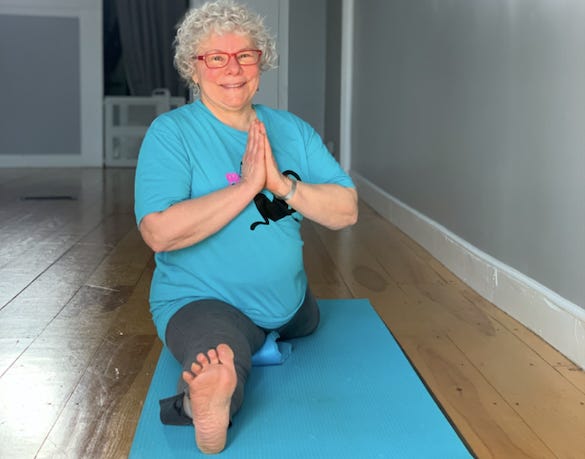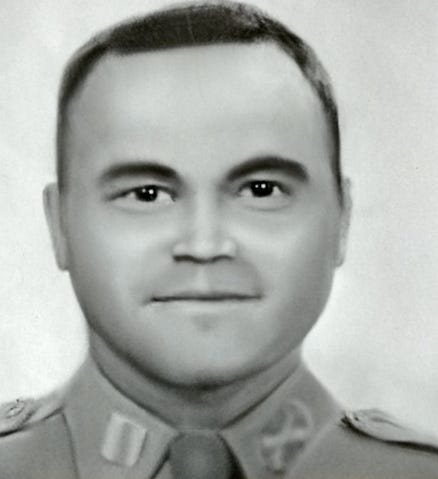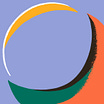In My Family, 70 Is Considered Young
Mary Elizabeth Birnbaum takes stock of what completing her seventh decade means in a family where many live well into their tenth.
My family is long-lived, with many members of previous generations surviving into their 80s and 90s. The last of them still living, my Aunt Priscilla, 96, remains a force to be reckoned with. The family joke is, “Oh, you’re 70? You’re only a kid!” But that’s not counting the slings and arrows, the reality checks of life. I’m always aware there are no guarantees, and everybody has a different experience of age. I suspect nobody has it easy. Some just have it easier.
The family joke is, “Oh, you’re 70? You’re only a kid!”
I’m a 70-year-old yoga practitioner. I revel in the new postures I master each year. So this is part of what age means to me—mastery. But that doesn’t mean that I am ready to fling up my hands in gold medal triumph in the Olympic Old Age Event. Aging well isn’t a competition. It’s a life challenge.
There’s a yoga proverb, “The wall is your teacher.” I find the physical limitations of aging are real. So although I can keep up with the fast-moving vinyasa class, although I can still slide into hanumanasana (a split), at a certain point, I sit down to stretch and admire the nifty arm balances of all the younger yogis. Maybe I can strengthen my shoulders and get up there when I am 80. Or maybe not; and unlike my younger self, I accept this. Nowadays, when I get home from class, I need a nap. I win by not only being disciplined, by sweating, but by being patient and careful.
I’m always aware there are no guarantees, and everybody has a different experience of age. I suspect nobody has it easy. Some just have it easier.
I teach gentle yoga, my class filled mostly with people around my age, and I simply share with them my experience of twenty-five years. I tell them the same things I tell myself: to carefully balance enthusiasm with patience, tapas with ahimsa. If your balance is wobbly, hold on to the wall. Steady, relaxed focus. Ride the breath like a hawk cruising the thermals. Feel the joy (ananda) in the posture. And with this modest connection to a yoga posture and yourself, something wonderful and powerful happens. Robert Frost put it this way: “When work is play, for mortal stakes.” It’s being a superhero—but a very different kind of superhero from what the young visualize.
The wall is my teacher. Passing the milestone of age 70 is humbling. I am more and more aware of the other side of the wall—the vast movement of the stars in the universe. My friends, contemporaries, agree that they are all starting to commune with the Ancestors who have passed into that world beyond the physical. An old friend whose parents had just died remarked, “Now we are the generation standing in front on that great escalator into the sky.” Another friend talked about taking care of her mother in her eighties, who before she died said, “I am standing on the landing.”
I see my generation and myself doing two things, which on the surface look a little contradictory. One is our impulse to divest ourselves of unnecessary belongings. I’ve read all these books, I thought the other day, scanning a bookcase. Maybe it’s time to send them to the thrift shop. I keep thinking of family members who might value an oil painting by my grandmother, or my mother’s old cast iron frying pans. Would any niece or granddaughter value my bead collection, some of them artisanal glass or semi-precious stones?
I teach gentle yoga, my class filled mostly with people around my age, and I simply share with them my experience of twenty-five years. I tell them the same things I tell myself: to carefully balance enthusiasm with patience, tapas with ahimsa.
The other impulse is to take inventory of our artifacts. I have gone through many things I’ve inherited—the letters of my mother’s family, the stories of my father, the photos of great-grandparents, and their roles in history. Gathering this knowledge of my ancestors into myself leads to a self-inventory. What have I accomplished? What have I left undone that is important to me to do for my family? This is probably all one thing—the giving away, the letting go, and that strange new inner storing up of memory and meaning.
I saw my father go through remarkable sea changes at age 92. First, when he held his first newborn great-grandchild in his arms. Maybe this is my imagination, but I believe I saw a thought pass across his face, that his work and worry were done, and his time to pass was now.
Then, when in the hospital with what the family realized was his last illness, I called in the entire family to say goodbye to my father. We thronged his room, as if to defy the Angel of Death, tears running down our faces. My father, dying of pneumonia and kidney failure, did not weep. When he was offered morphine to assuage oxygen hunger, he accepted, saying cheerfully, “I am ready for Freddie.”
I saw my father go through remarkable sea changes at age 92. First, when he held his first newborn great-grandchild in his arms. Maybe this is my imagination, but I believe I saw a thought pass across his face, that his work and worry were done, and his time to pass was now.
A veteran of World War II who had served as a Captain of Artillery, my father had marched through life flanked with imaginary howitzers, and after the 9/11 attack told us that he had dreamed he went to the Middle East with machine guns strapped to the arms of his wheelchair. In the hospital, suddenly, his impending death became his victory, his peace, and he revealed a tender side, as if he had just understood something profound. When a son-in-law whom he had long held at a cool distance said tearfully, “I love you, Saul,” he answered gently, “I love you too.”








Thanks so much, fellow oldsters & yogis, fellow seekers of what makes life beautiful!
Mary Birnbaum’s piece is lovely. Free of politics, free of jargon, free of -isms. The author speaks to the topic at hand, and by doing so, shines light on the process of life, which is also the process of death.